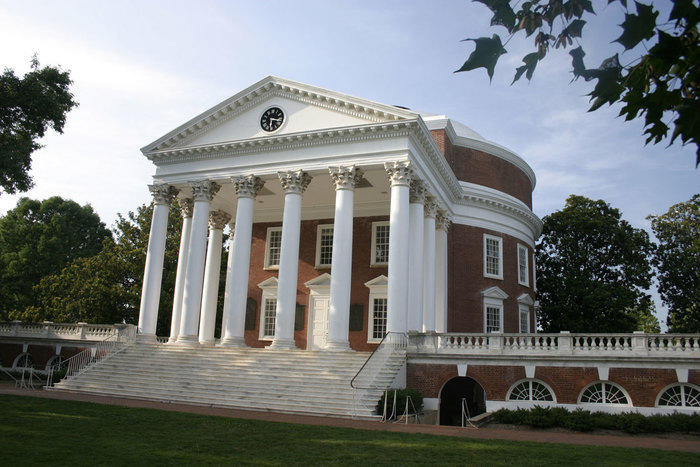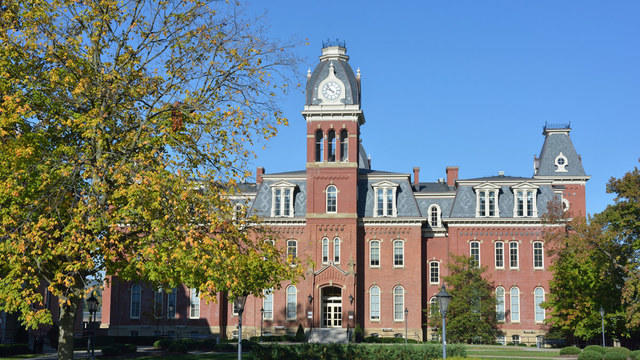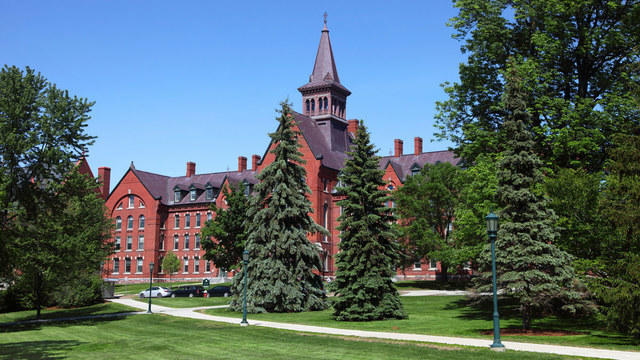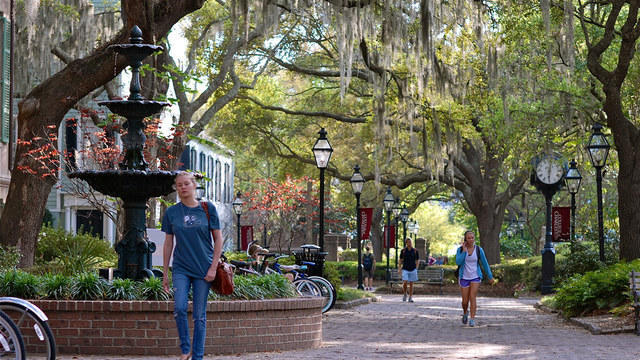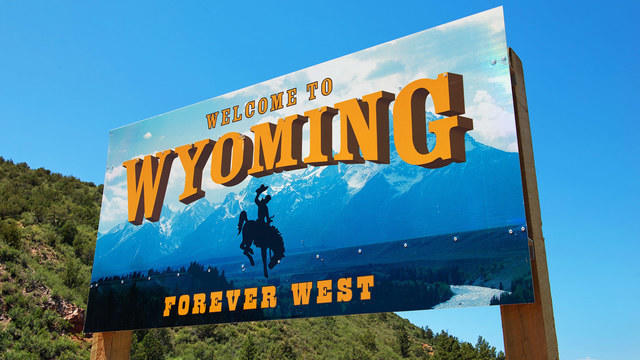Learn what it takes to get into the University of Virginia Law School.
See Acceptance Rates, Average LSAT Scores,
GPA & More
The University of Virginia Law School Overview
The University of Virginia is one of only a few academic institutions in the United States that has existed since the days of the Founding Fathers. Founded in 1819 by Thomas Jefferson, the University of Virginia began teaching law from its earliest days. As the school grew, the legal branch of the university came to be known as UVA Law. The University of Virginia Law School is now the second oldest continuously operating law school in the United States.
UVA Law has produced a surprising number of high profile lawyers, politicians, journalists, and public figures. Janet Napolitano earned her Juris Doctor (J.D.) degree from the University of Virginia Law School before going on to become the Security of Homeland Security under President Barack Obama. UVA Law also saw several members of the Kennedy family pass through its doors, including Ted Kennedy, Robert F. Kennedy, and Robert F. Kennedy Jr.
Unlike many law schools around the nation, UVA Law receives no money from the state of Virginia or the federal government and operates solely on private donations. Nonetheless, the University of Virginia Law School has seen multiple renovations and expansions over the years, with one of the largest campuses of any law school in the nation. Located in the historic city of Charlottesville, Virginia, the University of Virginia campus is close to the home of Thomas Jefferson, Monticello, as well as James Monroe's home, Highland.
Regarding academics, UVA Law offers a wide variety of concentrations, though students have the freedom to curate a curriculum to suit their educational and occupational goals. Here are just a few of the concentrations at UVA Law:
- Business Organization and Finance
- Commercial Law
- Communications and Media Law
- Constitutional Law
- Criminal Justice
- Employment and Labor Law
- Environmental and Land Use Law
- Family Law
- Health Law
- Human Rights and Civil Liberties
- Intellectual Property
- International and National Security Law
- Jurisprudence and Comparative Law
- Legal History
- Litigation and Procedure
- Public Policy and Regulation
- Race and Law
- Tax Law
In addition to their prestigious J.D. program, the University of Virginia Law School offers the following degree programs:
- Master of Laws (LLM)
- Doctor of the Science of Law (SJD)
- Dual-Degree Programs (Consult this link for more information)
Finally, the Virginia Law Review is one of the most cited legal journals in the United States. However, UVA Law produces a number of academic journals that span numerous subjects within the field of law. Here are just a few of UVA Law's most prominent journals:
- Virginia Journal of International Law
- Virginia Environmental Law Journal
- Virginia Journal of Law & Technology
- Virginia Journal of Social Policy & the Law
- Virginia Law & Business Review
- Virginia Sports & Entertainment Law Journal
- Virginia Tax Review Association
- Virginia Journal of Criminal Law
- Journal of Law and Politics
The University of Virginia Law School Rankings
School rankings are very important for prospective students in any discipline, but they are especially relevant for students of law. Law school rankings indicate the quality of education at each respective university. Additionally, rankings are often cited by employers and other academic institutions as a vital metric when evaluating a job candidate's eligibility. Every year, dozens of independent organizations and news outlets use raw data to determine which schools currently sit at the top of the list.
While rankings vary somewhat based on which organization is doing the research and which metrics are given the most weight, the top 10 law schools in the country tend to be the same across the board. As of 2019, the University of Virginia Law School generally falls at #8 or #9 on most lists, making it one of the best law schools in the nation.
The University of Virginia Law School Admissions
What Is The University of Virginia Law School Acceptance Rate?
Law school rankings also help determine how competitive a given law school will be for prospective students. In most cases, the higher a law school ranks, the harder it is to get accepted. However, a few other metrics, such as the "prestige" of the institution and type of academic programs offered can influence acceptance rates as well.
At the University of Virginia Law School, admissions are extremely competitive. While the average national acceptance rate for law schools is around 45%, it is much more difficult to get accepted into UVA Law. As of 2019, the University of Virginia Law School's acceptance rate sits at 20.17%. This is significantly lower than the national average and is also lower than many of the top law schools in the nation, which accept students at a collective rate of 21.10%.
Annual variations are important, but they are often dictated by forces outside of an individual student's or school's control. For example, the University of Virginia Law School (and any other law school) can only accommodate a certain number of students every year. In 2019, the University of Virginia Law School made offers to 918 of the 4,552 applicants. However, the acceptance rate would likely be much higher (as a percentage of the total) if there were fewer applicants in a given year.
In any case, there are still a number of standard metrics based on students' abilities that help determine a school's acceptance rate. Undergraduate GPA and LSAT scores are perhaps the two most important metrics, though various other aspects of each application are also considered. In 2019, the average undergraduate GPA among UVA Law applicants was 3.86. This average is on par with many other top law schools, like Harvard (3.86) and Yale (3.93).
There was less variation among the average LSAT scores between top law schools. This year, the average LSAT score for incoming students at the University of Virginia Law School was 168, though both Harvard and Yale had slightly higher average scores among their incoming students (173). You can find more statistics on the University of Virginia Law School's admissions for the class of 2023 in the table below:
| Applications | Offers | Matriculated | |
| Class of 2023 | 4552 | 918 (20.17%) | 304 (6.7%) |
| 25% | Median | 75% | |
| GPA | 3.59 | 3.86 | 3.94 |
| LSAT | 163 | 168 | 170 |
The University of Virginia Law School LSAT Percentiles
| 75th percentile | 170 |
| 50th percentile | 168 |
| 25th percentile | 163 |
Want to get into the University of Virginia Law School? Sign up for LSATMax today!
2019 Entering Class Profile
| Number of Students | 934 |
| LSAT Score | 168 |
| Undergraduate GPA | 3.86 |
| % Women | 41.6% |
| % Students of Color | 5.0% |
| % Enrolled Directly After College | N/A |
What Is The Tuition For the University of Virginia Law School?
| In-State Resident | Non-Resident | |
| Full Time | $54,000 | $57,000 |
| Part-Time | N/A | N/A |
What Are The Living Expenses At the University of Virginia Law School
| On-Campus | $21,323 |
| Off-Campus | $21,323 |
What Are The Housing Options At the University of Virginia Law School
| On-Campus | Yes |
| Off-Campus | Yes |
BAR Passage Rates At the University of Virginia Law School
| Reporting | 89.4% |
| First Time Takers | 329 |
| The University of Virginia Average | 93.5% |
| Virginia State Average | 75.6% |
| National Average | 54% |
Application Deadlines
When will the University of Virginia Law School application materials be available?
UVA Law applicants can access application materials via the University of Virginia school website starting on September 2nd.
When does the University of Virginia Law School begin accepting applications?
The University of Virginia Law School begins accepting applications as soon as the application materials are made available on September 2nd. The deadline to submit your application for the upcoming fall semester is March 3rd. Though applicants can still submit their applications after the March 3rd cutoff date, the admissions office cannot guarantee when these applications will be reviewed.
How are applications to the University of Virginia Law School submitted?
Like many other law schools, the University of Virginia Law School accepts applications online via the Law School Admission Council (LSAC) application. Applicants must follow a 9-step process in order to apply. The application process is outlined on the LSAC website.
Does the University of Virginia Law School have an "early admission" or an "early decision" process?
Yes, the University of Virginia Law School does offer a "Binding Expedited Decision" option. This means that, if accepted, applicants commit to UVA Law. The deadline for the expedited decision option is March 3rd. Applicants will receive a decision from the University of Virginia Law School no later than April 15th. You can learn more about the UVA Law application process right here.
How much is the application fee and when is the deadline?
| Application Fee | $80 |
| Early Decision Deadline | March 3rd |
| Regular Decision Deadline | March 3rd |
Does the University of Virginia Law School grant interviews?
The UVA Law admissions office does conduct interviews of qualified candidates via Skype or phone. However, applicants may not request an interview but must wait for the admissions office to reach out and schedule one.
Employment After the University of Virginia Law School
| Median Salary Private Sector | $190,000 |
| Median Salary Public Sector | $61,425 |
As one of the top law schools in the nation, the University of Virginia Law School has produced thousands of successful graduates. Many alumni go on to become politicians, judges, entrepreneurs, and successful trial lawyers. While not every graduate at UVA Law will work in law, the vast majority do. In any case, let's look at a few of the most recent job statistics for the University of Virginia Law School alumni:
- Employment Status — As of 2018, more than 98% of UVA Law alumni found employment after graduation.
- Location — Unlike some other top-tier law schools, many graduates from the University of Virginia Law School find out-of-state employment. As of the latest data, approximately 27% of UVA Law alumni work in the District of Columbia, 26% in New York, 8% in Virginia, 6% in Texas, and 5% in California.
- Job Sector — The vast majority of Virginia Law School graduates go on to work in the private sector. Approximately 71% of graduates work at a law firm, 26% work in the public sector, and the remainder work for businesses, academia, or are self-employed.
- Salary — Law firm employees report the highest salaries by far, followed by business, and then the public sector (government). Salaries for Virginia Law School students range from $61,000-$190,000.
Want to get into the University of Virginia Law School? Sign up for LSATMax today!




